Reflective Report: Analysis of Aboriginal Health in Australia
VerifiedAdded on 2022/09/13
|6
|1250
|12
Report
AI Summary
This reflective report analyzes the health challenges faced by Aboriginal and Torres Strait Islander peoples in Australia, focusing on the insights gained from a lecture on the topic. The student reflects on the significant health disparities, including lower life expectancy, and the impact of factors like poor lifestyle choices, socioeconomic conditions, and social discrimination. The report critically evaluates the influence of social determinants such as poverty, lack of education, and inadequate housing on the health outcomes of indigenous populations. It also emphasizes the importance of community-wide health assessments and culturally sensitive healthcare. The student proposes an action plan that includes addressing social disparities, improving access to health services, promoting self-care, and fostering a community free from racism to improve the overall well-being of Aboriginal and Torres Strait Islander peoples. The report concludes by highlighting the need for further knowledge and a commitment to improving indigenous health outcomes.
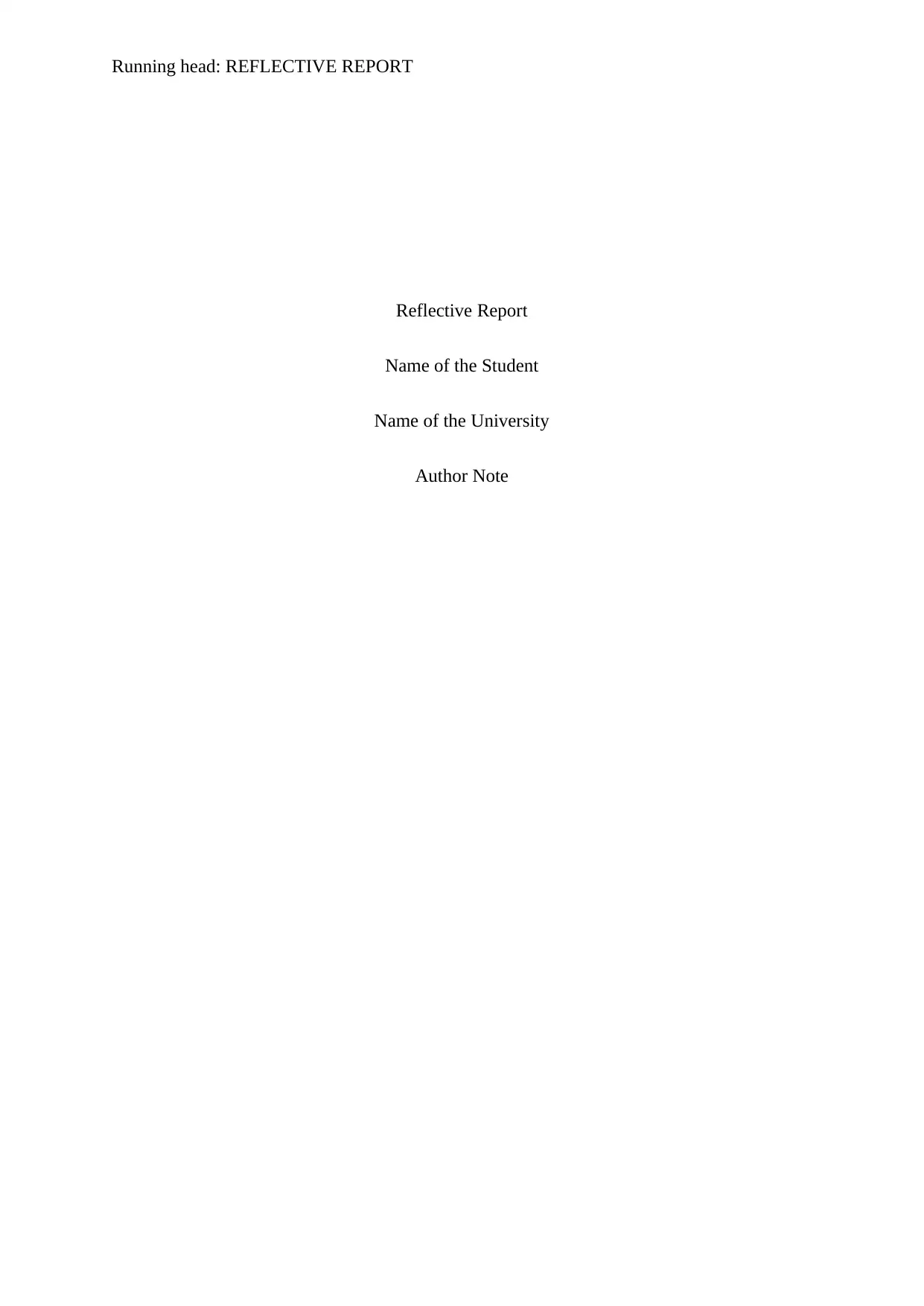
Running head: REFLECTIVE REPORT
Reflective Report
Name of the Student
Name of the University
Author Note
Reflective Report
Name of the Student
Name of the University
Author Note
Paraphrase This Document
Need a fresh take? Get an instant paraphrase of this document with our AI Paraphraser
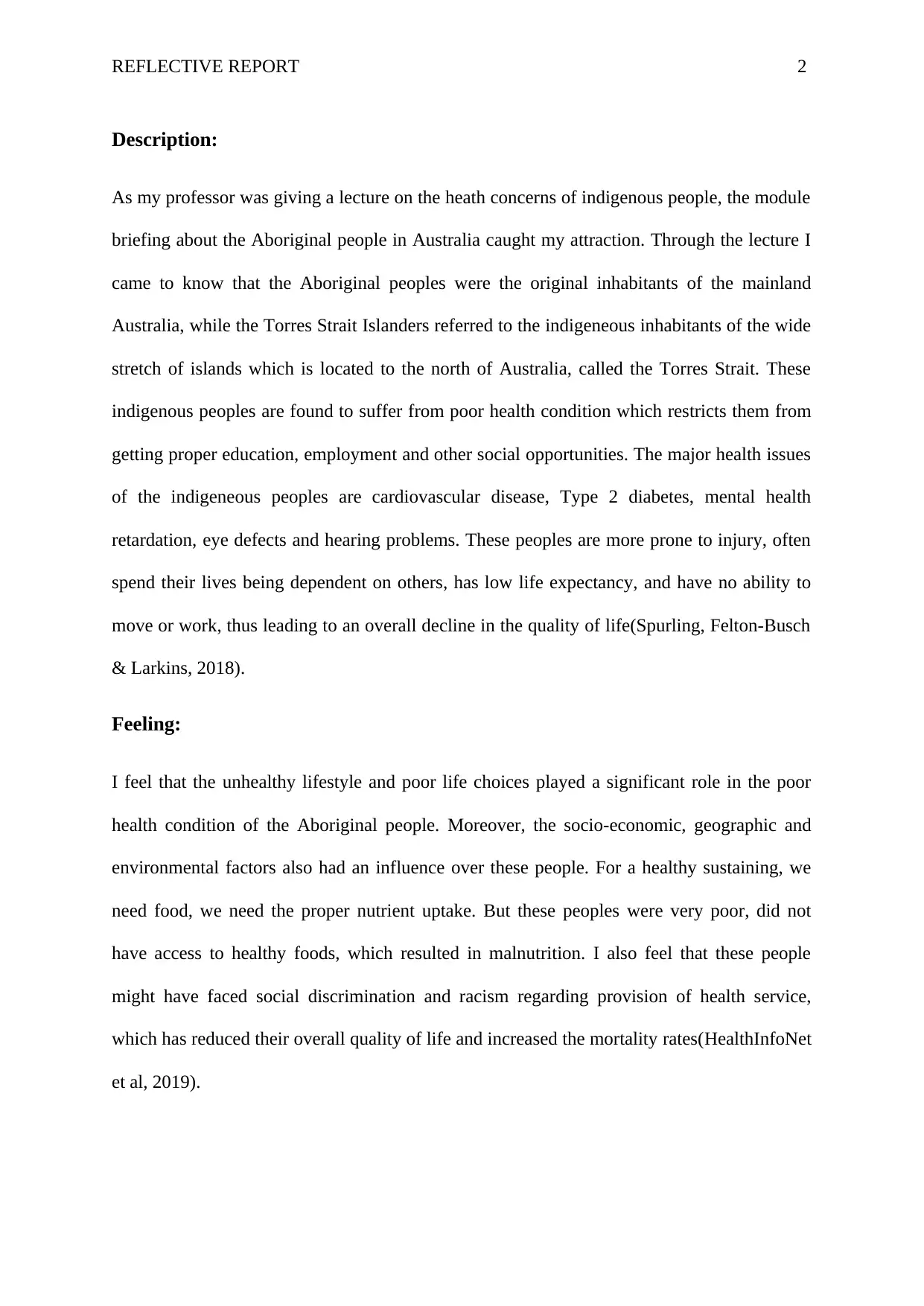
REFLECTIVE REPORT 2
Description:
As my professor was giving a lecture on the heath concerns of indigenous people, the module
briefing about the Aboriginal people in Australia caught my attraction. Through the lecture I
came to know that the Aboriginal peoples were the original inhabitants of the mainland
Australia, while the Torres Strait Islanders referred to the indigeneous inhabitants of the wide
stretch of islands which is located to the north of Australia, called the Torres Strait. These
indigenous peoples are found to suffer from poor health condition which restricts them from
getting proper education, employment and other social opportunities. The major health issues
of the indigeneous peoples are cardiovascular disease, Type 2 diabetes, mental health
retardation, eye defects and hearing problems. These peoples are more prone to injury, often
spend their lives being dependent on others, has low life expectancy, and have no ability to
move or work, thus leading to an overall decline in the quality of life(Spurling, Felton-Busch
& Larkins, 2018).
Feeling:
I feel that the unhealthy lifestyle and poor life choices played a significant role in the poor
health condition of the Aboriginal people. Moreover, the socio-economic, geographic and
environmental factors also had an influence over these people. For a healthy sustaining, we
need food, we need the proper nutrient uptake. But these peoples were very poor, did not
have access to healthy foods, which resulted in malnutrition. I also feel that these people
might have faced social discrimination and racism regarding provision of health service,
which has reduced their overall quality of life and increased the mortality rates(HealthInfoNet
et al, 2019).
Description:
As my professor was giving a lecture on the heath concerns of indigenous people, the module
briefing about the Aboriginal people in Australia caught my attraction. Through the lecture I
came to know that the Aboriginal peoples were the original inhabitants of the mainland
Australia, while the Torres Strait Islanders referred to the indigeneous inhabitants of the wide
stretch of islands which is located to the north of Australia, called the Torres Strait. These
indigenous peoples are found to suffer from poor health condition which restricts them from
getting proper education, employment and other social opportunities. The major health issues
of the indigeneous peoples are cardiovascular disease, Type 2 diabetes, mental health
retardation, eye defects and hearing problems. These peoples are more prone to injury, often
spend their lives being dependent on others, has low life expectancy, and have no ability to
move or work, thus leading to an overall decline in the quality of life(Spurling, Felton-Busch
& Larkins, 2018).
Feeling:
I feel that the unhealthy lifestyle and poor life choices played a significant role in the poor
health condition of the Aboriginal people. Moreover, the socio-economic, geographic and
environmental factors also had an influence over these people. For a healthy sustaining, we
need food, we need the proper nutrient uptake. But these peoples were very poor, did not
have access to healthy foods, which resulted in malnutrition. I also feel that these people
might have faced social discrimination and racism regarding provision of health service,
which has reduced their overall quality of life and increased the mortality rates(HealthInfoNet
et al, 2019).
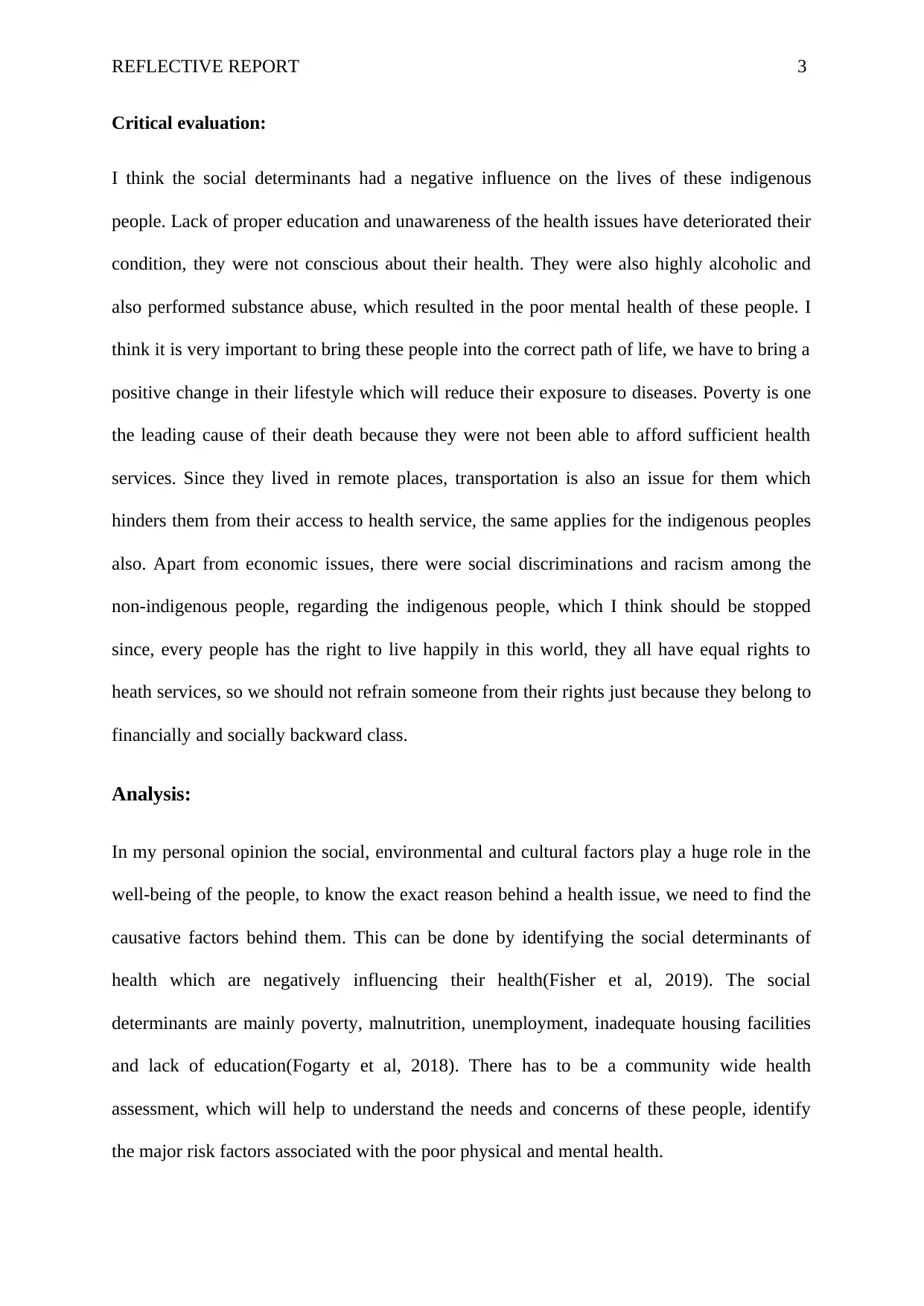
REFLECTIVE REPORT 3
Critical evaluation:
I think the social determinants had a negative influence on the lives of these indigenous
people. Lack of proper education and unawareness of the health issues have deteriorated their
condition, they were not conscious about their health. They were also highly alcoholic and
also performed substance abuse, which resulted in the poor mental health of these people. I
think it is very important to bring these people into the correct path of life, we have to bring a
positive change in their lifestyle which will reduce their exposure to diseases. Poverty is one
the leading cause of their death because they were not been able to afford sufficient health
services. Since they lived in remote places, transportation is also an issue for them which
hinders them from their access to health service, the same applies for the indigenous peoples
also. Apart from economic issues, there were social discriminations and racism among the
non-indigenous people, regarding the indigenous people, which I think should be stopped
since, every people has the right to live happily in this world, they all have equal rights to
heath services, so we should not refrain someone from their rights just because they belong to
financially and socially backward class.
Analysis:
In my personal opinion the social, environmental and cultural factors play a huge role in the
well-being of the people, to know the exact reason behind a health issue, we need to find the
causative factors behind them. This can be done by identifying the social determinants of
health which are negatively influencing their health(Fisher et al, 2019). The social
determinants are mainly poverty, malnutrition, unemployment, inadequate housing facilities
and lack of education(Fogarty et al, 2018). There has to be a community wide health
assessment, which will help to understand the needs and concerns of these people, identify
the major risk factors associated with the poor physical and mental health.
Critical evaluation:
I think the social determinants had a negative influence on the lives of these indigenous
people. Lack of proper education and unawareness of the health issues have deteriorated their
condition, they were not conscious about their health. They were also highly alcoholic and
also performed substance abuse, which resulted in the poor mental health of these people. I
think it is very important to bring these people into the correct path of life, we have to bring a
positive change in their lifestyle which will reduce their exposure to diseases. Poverty is one
the leading cause of their death because they were not been able to afford sufficient health
services. Since they lived in remote places, transportation is also an issue for them which
hinders them from their access to health service, the same applies for the indigenous peoples
also. Apart from economic issues, there were social discriminations and racism among the
non-indigenous people, regarding the indigenous people, which I think should be stopped
since, every people has the right to live happily in this world, they all have equal rights to
heath services, so we should not refrain someone from their rights just because they belong to
financially and socially backward class.
Analysis:
In my personal opinion the social, environmental and cultural factors play a huge role in the
well-being of the people, to know the exact reason behind a health issue, we need to find the
causative factors behind them. This can be done by identifying the social determinants of
health which are negatively influencing their health(Fisher et al, 2019). The social
determinants are mainly poverty, malnutrition, unemployment, inadequate housing facilities
and lack of education(Fogarty et al, 2018). There has to be a community wide health
assessment, which will help to understand the needs and concerns of these people, identify
the major risk factors associated with the poor physical and mental health.
⊘ This is a preview!⊘
Do you want full access?
Subscribe today to unlock all pages.

Trusted by 1+ million students worldwide
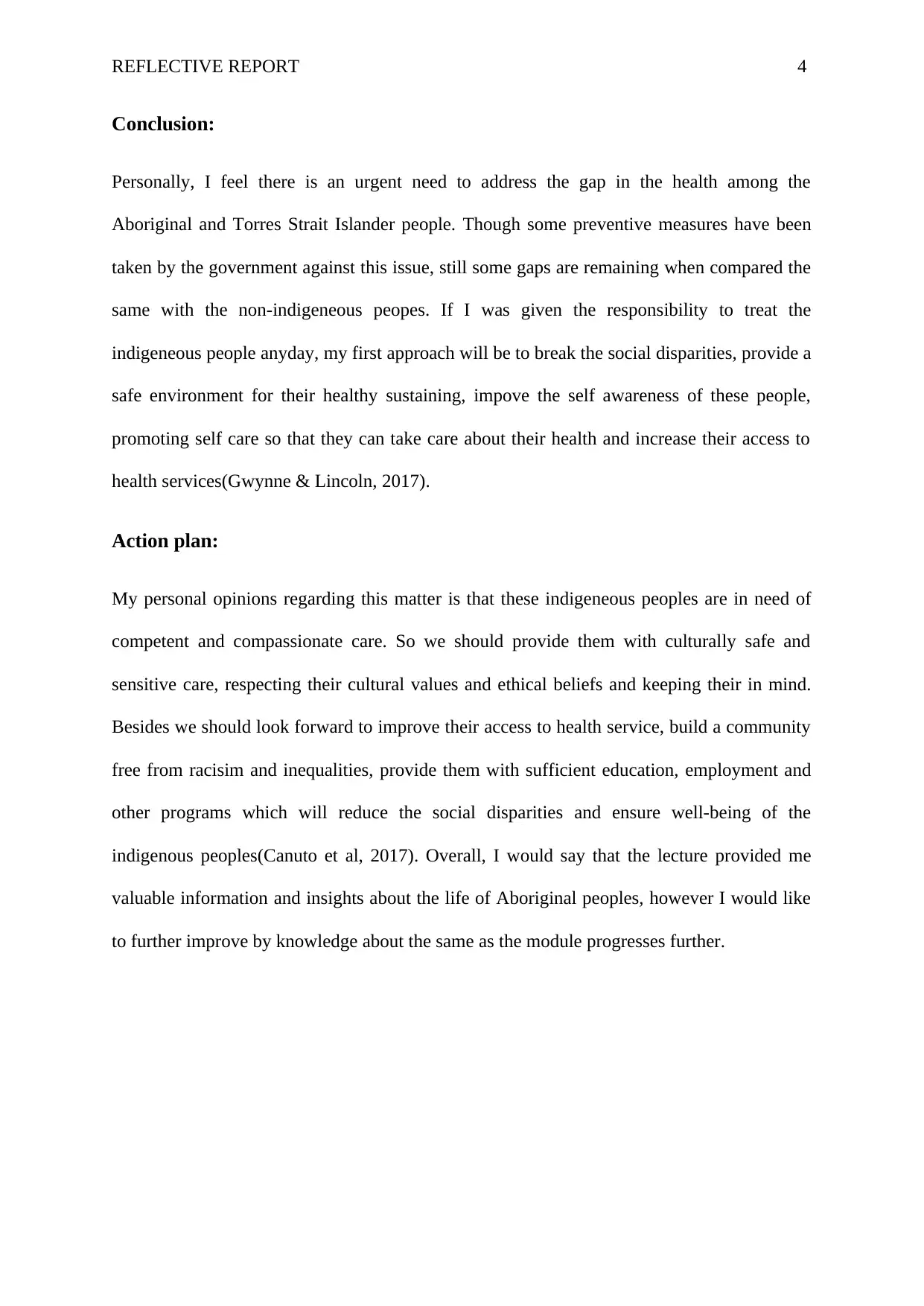
REFLECTIVE REPORT 4
Conclusion:
Personally, I feel there is an urgent need to address the gap in the health among the
Aboriginal and Torres Strait Islander people. Though some preventive measures have been
taken by the government against this issue, still some gaps are remaining when compared the
same with the non-indigeneous peopes. If I was given the responsibility to treat the
indigeneous people anyday, my first approach will be to break the social disparities, provide a
safe environment for their healthy sustaining, impove the self awareness of these people,
promoting self care so that they can take care about their health and increase their access to
health services(Gwynne & Lincoln, 2017).
Action plan:
My personal opinions regarding this matter is that these indigeneous peoples are in need of
competent and compassionate care. So we should provide them with culturally safe and
sensitive care, respecting their cultural values and ethical beliefs and keeping their in mind.
Besides we should look forward to improve their access to health service, build a community
free from racisim and inequalities, provide them with sufficient education, employment and
other programs which will reduce the social disparities and ensure well-being of the
indigenous peoples(Canuto et al, 2017). Overall, I would say that the lecture provided me
valuable information and insights about the life of Aboriginal peoples, however I would like
to further improve by knowledge about the same as the module progresses further.
Conclusion:
Personally, I feel there is an urgent need to address the gap in the health among the
Aboriginal and Torres Strait Islander people. Though some preventive measures have been
taken by the government against this issue, still some gaps are remaining when compared the
same with the non-indigeneous peopes. If I was given the responsibility to treat the
indigeneous people anyday, my first approach will be to break the social disparities, provide a
safe environment for their healthy sustaining, impove the self awareness of these people,
promoting self care so that they can take care about their health and increase their access to
health services(Gwynne & Lincoln, 2017).
Action plan:
My personal opinions regarding this matter is that these indigeneous peoples are in need of
competent and compassionate care. So we should provide them with culturally safe and
sensitive care, respecting their cultural values and ethical beliefs and keeping their in mind.
Besides we should look forward to improve their access to health service, build a community
free from racisim and inequalities, provide them with sufficient education, employment and
other programs which will reduce the social disparities and ensure well-being of the
indigenous peoples(Canuto et al, 2017). Overall, I would say that the lecture provided me
valuable information and insights about the life of Aboriginal peoples, however I would like
to further improve by knowledge about the same as the module progresses further.
Paraphrase This Document
Need a fresh take? Get an instant paraphrase of this document with our AI Paraphraser
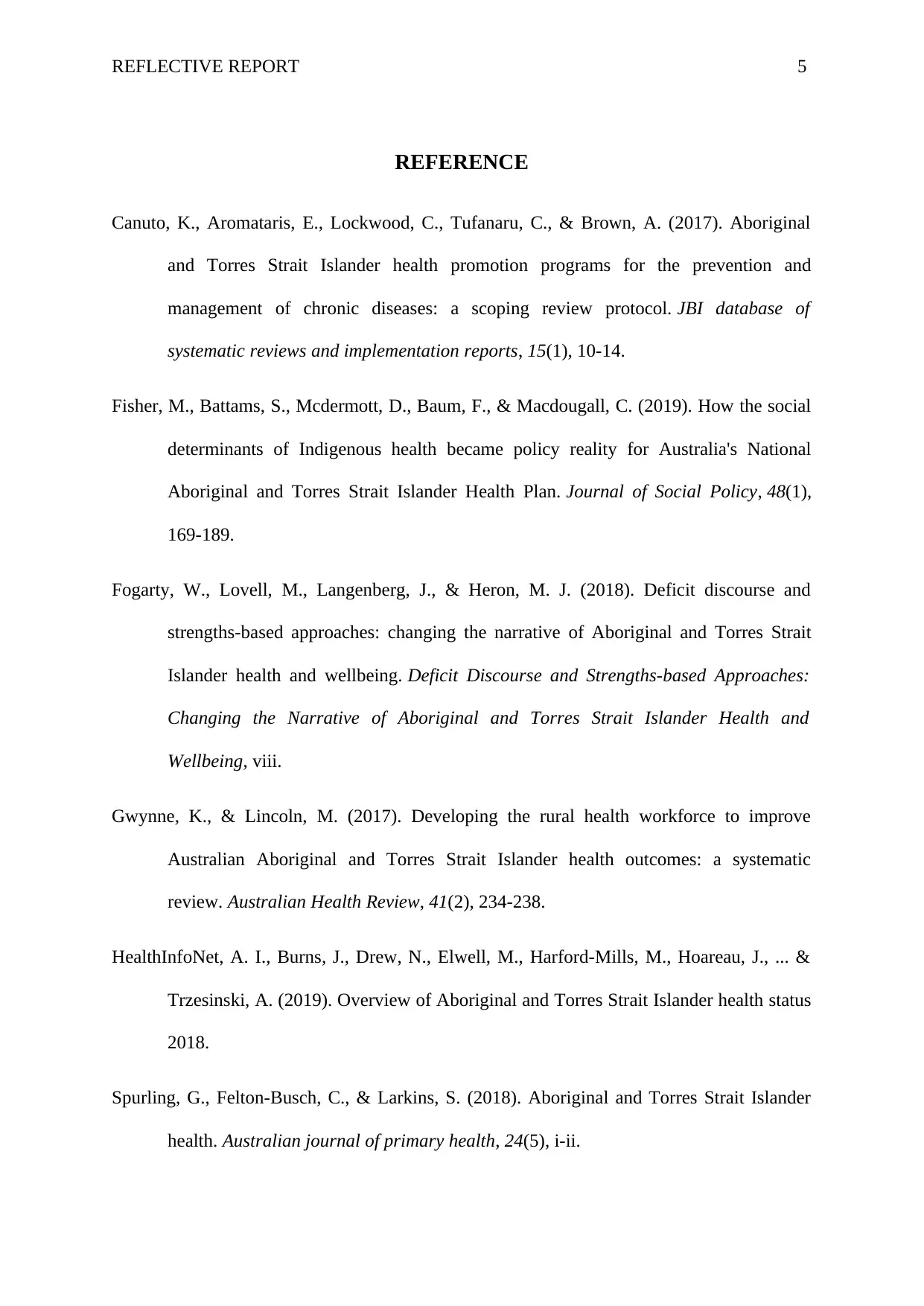
REFLECTIVE REPORT 5
REFERENCE
Canuto, K., Aromataris, E., Lockwood, C., Tufanaru, C., & Brown, A. (2017). Aboriginal
and Torres Strait Islander health promotion programs for the prevention and
management of chronic diseases: a scoping review protocol. JBI database of
systematic reviews and implementation reports, 15(1), 10-14.
Fisher, M., Battams, S., Mcdermott, D., Baum, F., & Macdougall, C. (2019). How the social
determinants of Indigenous health became policy reality for Australia's National
Aboriginal and Torres Strait Islander Health Plan. Journal of Social Policy, 48(1),
169-189.
Fogarty, W., Lovell, M., Langenberg, J., & Heron, M. J. (2018). Deficit discourse and
strengths-based approaches: changing the narrative of Aboriginal and Torres Strait
Islander health and wellbeing. Deficit Discourse and Strengths-based Approaches:
Changing the Narrative of Aboriginal and Torres Strait Islander Health and
Wellbeing, viii.
Gwynne, K., & Lincoln, M. (2017). Developing the rural health workforce to improve
Australian Aboriginal and Torres Strait Islander health outcomes: a systematic
review. Australian Health Review, 41(2), 234-238.
HealthInfoNet, A. I., Burns, J., Drew, N., Elwell, M., Harford-Mills, M., Hoareau, J., ... &
Trzesinski, A. (2019). Overview of Aboriginal and Torres Strait Islander health status
2018.
Spurling, G., Felton-Busch, C., & Larkins, S. (2018). Aboriginal and Torres Strait Islander
health. Australian journal of primary health, 24(5), i-ii.
REFERENCE
Canuto, K., Aromataris, E., Lockwood, C., Tufanaru, C., & Brown, A. (2017). Aboriginal
and Torres Strait Islander health promotion programs for the prevention and
management of chronic diseases: a scoping review protocol. JBI database of
systematic reviews and implementation reports, 15(1), 10-14.
Fisher, M., Battams, S., Mcdermott, D., Baum, F., & Macdougall, C. (2019). How the social
determinants of Indigenous health became policy reality for Australia's National
Aboriginal and Torres Strait Islander Health Plan. Journal of Social Policy, 48(1),
169-189.
Fogarty, W., Lovell, M., Langenberg, J., & Heron, M. J. (2018). Deficit discourse and
strengths-based approaches: changing the narrative of Aboriginal and Torres Strait
Islander health and wellbeing. Deficit Discourse and Strengths-based Approaches:
Changing the Narrative of Aboriginal and Torres Strait Islander Health and
Wellbeing, viii.
Gwynne, K., & Lincoln, M. (2017). Developing the rural health workforce to improve
Australian Aboriginal and Torres Strait Islander health outcomes: a systematic
review. Australian Health Review, 41(2), 234-238.
HealthInfoNet, A. I., Burns, J., Drew, N., Elwell, M., Harford-Mills, M., Hoareau, J., ... &
Trzesinski, A. (2019). Overview of Aboriginal and Torres Strait Islander health status
2018.
Spurling, G., Felton-Busch, C., & Larkins, S. (2018). Aboriginal and Torres Strait Islander
health. Australian journal of primary health, 24(5), i-ii.

REFLECTIVE REPORT 6
⊘ This is a preview!⊘
Do you want full access?
Subscribe today to unlock all pages.

Trusted by 1+ million students worldwide
1 out of 6
Related Documents
Your All-in-One AI-Powered Toolkit for Academic Success.
+13062052269
info@desklib.com
Available 24*7 on WhatsApp / Email
![[object Object]](/_next/static/media/star-bottom.7253800d.svg)
Unlock your academic potential
Copyright © 2020–2025 A2Z Services. All Rights Reserved. Developed and managed by ZUCOL.





